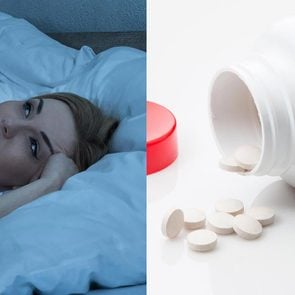Do Melatonin Gummies Work?
Updated: Mar. 14, 2022
Melatonin, the sleep hormone, is a common supplement that comes in many forms, including gummies. Here's what you need to know about melatonin gummies, including timing and dosing and its potential side effects.
When sound sleep is a dream
With the Covid-19 pandemic, a social justice movement, and an upcoming election, it’s hardly surprising that many of us are struggling to get a good night’s sleep. According to a survey conducted by the Kaiser Family Foundation, published in August 2020, Covid-19 has negatively impacted mental health and wellbeing, with 36 percent of adults reporting difficulty sleeping. Could melatonin gummies be the Rx for these sleep-deprived times?
Here’s what you need to know about the common sleep supplement.
What melatonin does to the body
Melatonin is produced by the pineal gland, which is nestled at the base of the brain just below the hypothalamus. Many living things, from humans to plants to fungi and bacteria, make melatonin, a hormone and also a powerful antioxidant. For us, melatonin’s main role is to regulate sleep and wakefulness.
“Our levels of melatonin generally start to rise in the evening, remain high throughout the night, and are typically lower in the morning and throughout the day,” explains Sarah Morsbach Honaker, PhD, an assistant professor at the Indiana University School of Medicine and director of behavioral sleep medicine at Riley Hospital for Children in Indianapolis. “When melatonin increases, we tend to feel more tired.”
Melatonin also reduces core body temperature, which helps to bring on sleep, says Renata L. Riha, MD, a consultant in sleep and respiratory medicine at the Royal Infirmary of Edinburgh in Scotland. Even when people’s melatonin levels are low, sleep is possible, says Dr. Riha. “People who have their pineal gland removed have only minimal disruption to their sleep.”
Darkness cues the pineal gland to secrete melatonin, which means that sitting under bright lights in the evening can suppress the release of melatonin and make it more difficult for some people to fall asleep, says Honaker. For this reason, sleep experts recommend unplugging—from computers, phones, TVs—at least 30 minutes before you go to bed.

What the science says
Given the role of melatonin in the body, it’s no surprise that melatonin supplements have become a popular and widely available sleep aid. But there’s not a lot of scientific evidence for their effectiveness. In a review of studies, published in 2017 in Sleep Medicine Reviews, Dr. Riha and her colleagues look at 12 randomized controlled trials—the gold standard for measuring the safety and effectiveness of a therapy—to see how effective melatonin is in improving sleep. They found that melatonin helps reduce sleep latency (the amount of time spent in bed before drifting off) for people with primary insomnia and those with a condition called delayed sleep phase syndrome. In the latter, a person’s sleep cycle is severely out of sync with the 24-hour day.
“Melatonin supplements can induce sleepiness, but they’re not a hypnotic drug,” says Dr. Riha. “They can help people to regulate their circadian rhythm and be useful in treating jet lag if administration is properly timed.” The best use of melatonin, she adds, “is for people who have been born without eyes or have lost their eyesight completely.”
When’s the best time to take melatonin?
Melatonin’s effects kick in quickly. So it’s more likely to help if you take it about a half-hour before bedtime, Honaker says. For people with delayed sleep-wake phase disorder, a tiny dose of melatonin five hours before bedtime can help nudge their sleep schedule back into normal territory. This approach can also be effective for jet lag. “Melatonin is best used under the supervision of a health care professional, who can provide guidance in a way that is safe and effective,” Honaker advises.
Melatonin supplements are not regulated
As with all nutritional supplements, over-the-counter melatonin supplements, including melatonin gummies, are not regulated or tested by the U.S. Food and Drug Administration. “If you are taking a melatonin supplement, it’s difficult to feel confident that the dose on the label is the dose that you’re getting,” says Honaker. “There can also be lot-to-lot variation within the same brand, which may explain why people might find melatonin helpful for a time and then find less benefit when they switch to another brand or bottle.”
In a study, published in 2017 in Journal of Clinical Sleep Medicine, Canadian researchers analyzed 31 melatonin supplements and found their melatonin content ranged from less than 83 percent of the amount stated on the label to nearly five times as much as the label claimed. “Though this is unlikely to present a significant health concern, evidence suggests that higher doses of melatonin could lead to unpleasant or unexpected side effects in some patients,” the authors warned.
Eight of the supplements contained serotonin, which can be toxic in relatively low amounts. According to Honaker, “the safest option is to take pharmaceutical-grade melatonin,” which must be prescribed.
Animal-derived melatonin carries a small, but real risk
Another worrisome concern: Melatonin in gummies and other supplements may come from the pineal glands of cattle or pigs. Products containing non-animal-based melatonin—it’s synthesized in a lab—are the other option, and considered safer. Dr. Riha advises against using melatonin from animal pineal glands because it carries “a tiny but real risk” of transmitting Creutzfeldt-Jakob disease (aka mad cow disease) and similar conditions that can be spread by exposure to contaminated neural tissue.
“It’s best to have your melatonin prescribed to you by your physician and the melatonin should be from a licensed, pharmaceutical manufacturer,” she says. Dietary supplement makers may seek out verification or certification from third-party groups like NSF International and the United States Pharmacopeia, which list the products that meet their quality standards on their websites.
What’s the best dose?
The most appropriate dose of melatonin to take depends on whether or not it is a long-acting compound, and why it’s being taken, Dr. Riha says. “This can range from as little as 0.5 mg for the completely blind at the same time every day, or for helping fight jet lag, to 20 mg for other sleep disorders. Usually, taking over 5 mg is unlikely to increase effectiveness, although this can vary,” she adds.
Melatonin isn’t effective for everyone, and it can make some people feel groggy in the morning or when they wake up, Dr. Riha notes. “Some people experience vivid dreams and others get a headache or feel nauseated or dizzy. These symptoms are not common but do occur.”
Studies of long-term users of melatonin, for example, people with circadian rhythm disorders, have not found serious long-term effects, she adds, but “we must be careful and consider any new health problems in the correct context.”
Who shouldn’t take melatonin?
Melatonin may affect the reproductive system, especially in adolescents. And women shouldn’t use it during breastfeeding or pregnancy unless they’ve discussed with their physician, says Dr. Riha. People with certain conditions, including type 1 diabetes, epilepsy, or autoimmune diseases, should exercise caution when it comes to melatonin. So should organ transplant patients and people who take blood thinners. “However, the risks and benefits can be discussed with your physician,” says Dr. Riha.
The bottom line
Melatonin can act as a sleep aid to improve your sleep quality. The sleep hormone is available in many supplement forms, ranging from melatonin gummies to sprays. Before you buy a product, look for the USP verification mark or NSF certification. If you’re unsure about a product or whether it’s right for you, consult your doctor for confirmation.




















